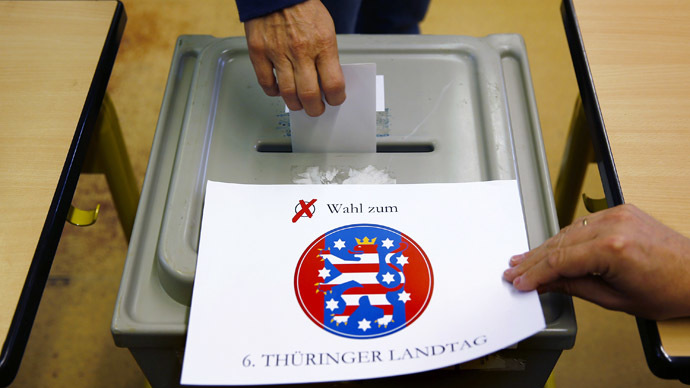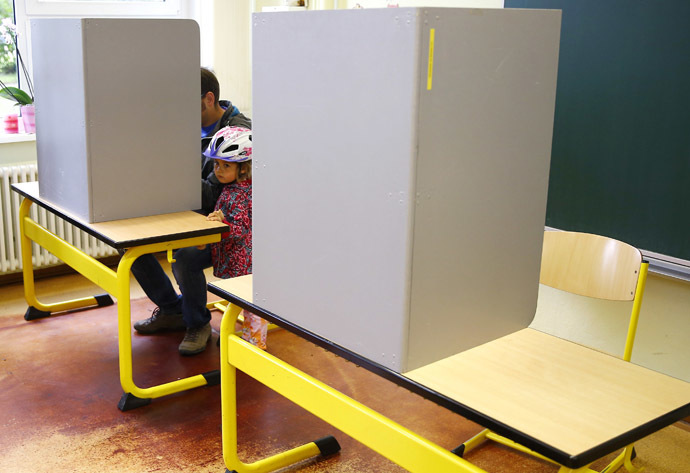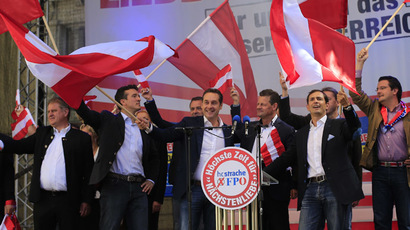German euroskeptics surge in two more state parliaments

The eurosceptic ‘Alternative for Germany’ party got more than ten percent of the vote in the country's regional elections on Sunday, making the right-wing a growing threat for Chancellor Angela Merkel's conservatives.
The AFD party won 10.1 percent of the vote in Thuringia and 11.9 percent in Brandenburg, according to projections on Germany's ARD TV announced after voting ended at 6 pm Sunday (1600 GMT).
Two weeks ago, the party already won 9.7 percent in an election in Saxony. With this weekend's results, the AFD will now have seats in three state assemblies. According to predictions by political analysts, the party has a strong chance of entering Germany’s federal parliament after the 2017 general election.
Founded in early 2013 to oppose eurozone bailouts, it was branded as a group of “unelectable mavericks” by the German political elite. Yet, the AFD won over seven percent of the vote in the EU elections in May, entering the 28-nation bloc’s parliament.
The 52-year-old party leader Bernd Lucke said the recent results in two more eastern states add to the momentum of the party. “We're delighted that voters have made the choice for a political renewal,” he told German TV.
Originally calling for a return to the Deutsche Mark instead of the eurozone’s unified currency, the party's message has broadened to include education, security and other issues in its campaign.
With previous allegations of the AFD being hijacked by extremists, the party leader was even happier with the recent results, saying: “We're not going to sit still and let the other parties bad-mouth us.”
Chancellor Angela Merkel recently admitted that the AFD is a “problem”.
Merkel's Christian Democratic Union (CDU) won 34.4 percent in Thuringia, but it's not clear yet whether it will stay in power in the region, depending on whether their junior coalition partners, the center-left Social Democrats (SPD), which won 12.3 percent, switch to support the Left Party (27.7 percent votes), in a coalition with the Greens and their 5.6 percent.

Merkel's pro-European CDU has ruled out any coalition with the AFD.
Europe saw a remarkable shift towards right-wing and eurosceptic political parties after the EU parliamentary elections in May.
The UK Independence Party (UKIP) beat off competition from the country's Lib Dems, Conservatives and Labour, garnering 27.5 percent of the vote. France's National Front, known for its anti-immigration and anti-EU rhetoric, got 25 percent.
MORE:The right storms Europe vote: Your quick guide to the anti-EU hardline
Along with the anti-Eurozone position, some new players on the EU political scene have expressed their concern regarding Brussels’ sanctions aimed at Russia.
After the earlier round of sanctions, Heinz-Christian Strache, Chairman of the right-wing Freedom Party of Austria, which has 20 percent of seats in the lower chamber of the national parliament and showed similarly strong results in this year’s European parliamentary election, criticized the EU.
“In just a few days after the [Russian] sanctions came into force they hurt out agriculture. The EU is thinking on how to mitigate it. Instead of putting Russia on its knees, they drag our farmers to ruin with their senseless sanctions policy,” Strache said.
According to Beatrix von Storch, a Euro MP for Germany’s AFD, her country's answer to Ukraine crisis should be setting up a free trade agreement with Russia to guarantee “German business interests.”














